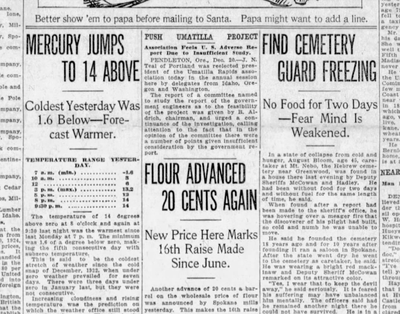This day in history: Caretaker at Spokane cemetery nearly died in frigid cold snap

From 1974: Washington Attorney General Slade Gorton visited Spokane and said the state’s residents “would be better off” if pulltabs and punchcards were banned.
The gambling devices, which were sold at taverns and bars, had created problems of fraud and cheating, he said.
On a related note, Gorton predicted that the 1975 legislature would “very likely” put another state lottery proposal on the ballot. A lottery proposal had been voted down in the last general election because it failed to earn a 60% majority.
Gorton said the state’s gambling laws were complex and difficult to enforce, and he said it would be necessary to increase the staff of the state’s gambling commission to deal with the problem.
From 1924: August Bloom, 45, the caretaker at Mount Nebo Cemetery near Greenwood Cemetery on Government Way, nearly succumbed to the region’s bitter cold snap.
Deputies found Bloom in the caretaker’s house at the cemetery, “so cold and numb he was unable to move.”
He had been without food and fuel for two days while temperatures dipped below zero. They found him hovering over “a meager fire” that was built by a good Samaritan who had found Bloom and reported his plight.
Bloom said he used to run a saloon in Spokane. He said he founded the cemetery 18 years ago and when statewide prohibition arrived, he moved to the cemetery as the full-time caretaker.
Deputies feared that “his suffering had unbalanced him mentally,” and they took him to the hospital ward to recover.
Spokane had had five days in a row in which temperature fell below zero.